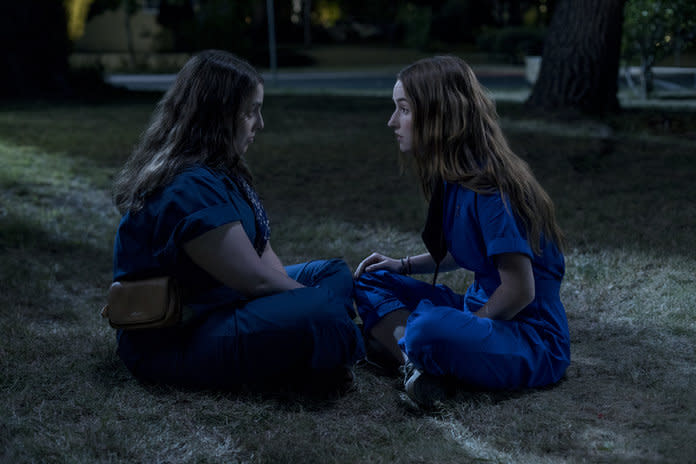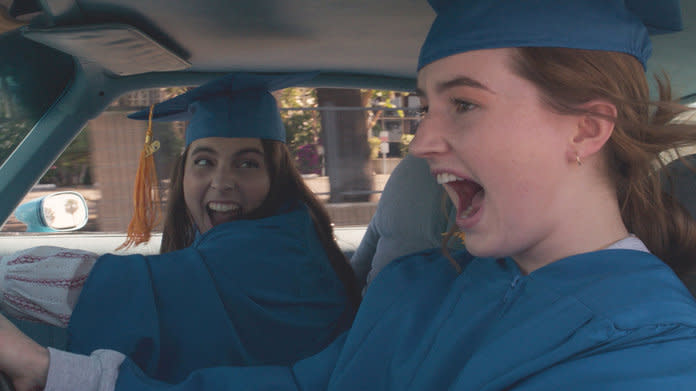Booksmart Isn't the "Female Superbad "
When Booksmart premiered at South by Southwest in March, I was inundated with glowingly positive reviews, most of which found a way to wedge a Superbad reference in the first paragraph (like I just did, yes, but bear with me).
“The best comedy of its kind since Superbad,” read one review. “A hilarious female Superbad revamp,” reads another. “Beanie Feldstein and Kaitlyn Dever give Superbad a run for its money.”
In short, any variation of “Booksmart = Superbad, but girls” that can be written, has.

Columbia Pictures/Everett Collection
But why are we so quick to compare Booksmart to the box of penis jokes Judd Apatow created in 2007 with Superbad? The fact that the stars of each respective film are siblings (Booksmart’s Feldstein and Superbad’s Jonah Hill) doesn’t hurt — but Feldstein family ties aside, both projects focus on two unpopular high school seniors and best friends desperate to kick off their final summer before college with a healthy dose of debauchery.
But if we look past structure alone, the films, released 12 years apart, really have nothing in common.
Booksmart opens with Molly (Feldstein) sitting in her room, listening to a motivational voice tell her she’s a “winner” as the camera pans across emblems of her personal academic success (awards, a Valedictorian stole) and portraits of her heroes (Michelle Obama, Ruth Bader Ginsburg). “Stand atop the mountain of your success and look down at everyone who’s ever doubted you — f—k those losers,” the voice demands.
In the beginning sequence we learn everything we need to know about the main characters. Molly and her best friend Amy (Dever) have been so focused on achievement that they forgot to enjoy their high school experience, meanwhile, their peers managed to score Ivy League acceptance letters and party every weekend. Upon this realization, Molly and Amy set out to cram four years of fun into a single evening.

RELATED: Losing a Loved One Changed the Way Actress Beanie Feldstein Sees the World
Though Superbad, too, centers on a night of partying, its raunchy approach (which the mention of a porn site called The Vagtastic Voyage clues us into in the film’s very first scene) couldn’t be further from Booksmart’s well-intentioned FOMO.
Overachieving Molly isn’t anything like the porn-obsessed Seth — so why the urge to compare the two?
From my perspective, Booksmart may actually be the anti-Superbad, but even if substance matched the structure, the comparison feels limiting, and judging by its frequency, all too instinctive. Remember when Bridesmaids was being touted as the “Female Hangover”? All those movies shared was comedic ensemble casts and an R-rating. Is it simply a lack of creativity that drives us to align innovative women-led films to their male counterparts, or does the ratio of all-female to all-male movies in the canon cause us to subconsciously view the former as derivative?
Further driving the two apart is the garish humor of Superbad, the shock-factor of which hasn’t aged well. In a post-Me Too world, does anyone want to hear Jonah Hill describe a woman as looking like “she can take a dick” or watch him gag after getting menstrual blood on his leg? Then again, did we ever?
Booksmart is an R-rated movie, make no mistake, but it didn’t earn its kudos by way of gratuity. It goes places that still aren’t commonplace in mainstream media — there’s candid talk of female masturbation, and one of its two leads, Amy (Dever), is openly gay — but none of it feels like a ploy to reach a target demo. It handles token coming-of-age moments (an awkward sexual experience or first drunken night) with a good-natured humor, careful not to exploit them for easy laughs.

From the Elizabeth Warren sticker on Molly’s car to the gender neutral bathrooms at their L.A. high school, Booksmart is undoubtedly grounded in our times — sometimes to shudder-inducing heights (the drama department is putting on a production called “Shakespeare in the Park-ing Lot,” staged outside of a Whole Foods).
The film is its own beast — a quick, modern, and honest comedy led by strong and dynamic characters and a talented first-time director (Olivia Wilde). To overlook its uniqueness and relegate it to the same category as a movie about horny teenage boys is a mistake.
Comedy has evolved in the past 12 years, and so, too, has the way we tell young women’s stories — no two are the same, and more and more filmmakers are beginning to convey this onscreen.
With the inventive Eighth Grade, 14-year-old Kayla (Elsie Fisher) navigates the cringe-filled waters of middle school in a way that is both painfully relatable and deeply personal; in Lady Bird, Saoirse Ronan’s quirky and naïve titular character packs a lifetime worth of lessons into her senior year, but it’s her relationship with her protective mother (played by Laurie Metcalf) that grounds the film. In first-time director Kelly Fremon Craig’s The Edge of Seventeen, Nadine (Hailee Steinfeld) finds an unlikely confidant in her wry high school teacher (Woody Harrelson), a relationship that would feel inorganic or inappropriate in any other script.
We can spend all day brainstorming coming-of-age movies with some sort of parallel to Booksmart but the truth is that it’s only as derivative as we want to make it. Booksmart is a quick-witted, heartfelt original — Feldstein and Dever’s chemistry is magnetic, and cameos from veteran comedians like Lisa Kudrow, Will Forte, Jason Sudeikis, and Jessica Williams only elevate its singular magic. The film is the first of its kind, and you’d be remiss to walk into the theater thinking anything but.


